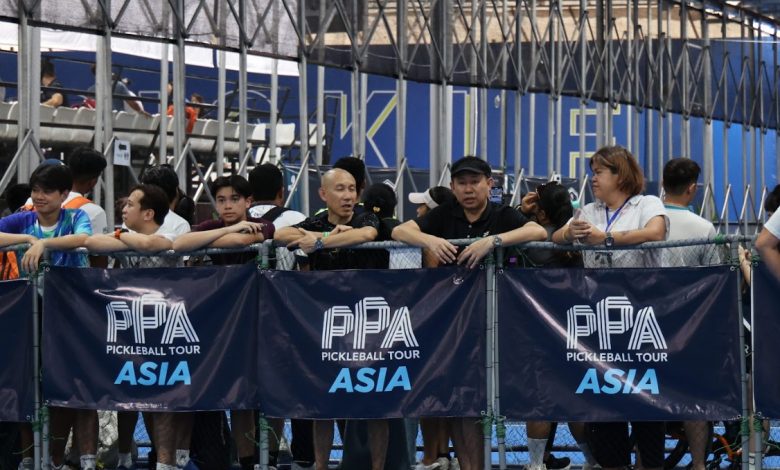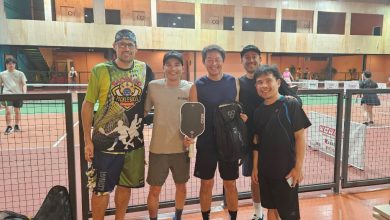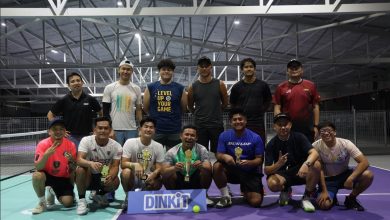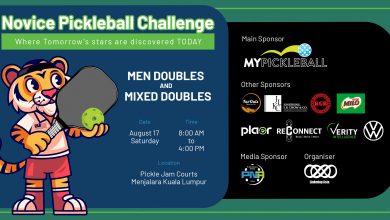PPA’s First Event in Asia Leaves Many Malaysians Feeling Exploited Rather Than Loved

As the saying goes, “Perception is reality,” and the perception among many Malaysian amateur pickleballers who participated in the first PPA Tour tournament to take place in Asia has been one of disappointment.
When we collated and encapsulated much of the negative feedback received, the perception among many amateur players was that the PPA saw the event as a money grab, not as a way to build goodwill and loyalty within the Malaysian pickleball ecosystem.
Let’s be clear: We applaud Vincent Siow and his teams at Panas Express and 9Pickle for bringing the PPA Asia Tour to Malaysia. However, many amateur players were left with a bad taste in their mouths, and we hope that the PPA takes note of the feedback and aims to improve as the tour continues.
So, where do we start?
No Feedback or Communication
In the run-up to the tournament, many people who tried to contact the organisers for clarification or to request changes were met with… tumbleweed.
Several players reported that PPA ignored their established DUPR IDs (provided at registration) and instead created new, duplicate DUPR accounts without their permission or notification. When they reached out via the published communication channels for assistance, again—they were met with silence.
Money Grab
If you read the fine print, PPA made it clear that they reserved the right to combine categories. However, considering the price players were asked to pay—over RM400 per person for a single category—it’s reasonable to expect the organiser would make significant efforts to fill each category.
This did not appear to be the case.
Unable to fill categories, the organisers routinely combined intermediate and open-level participants across numerous divisions.
One example was in the women’s over-50 singles, where one participant expressed her frustration:
“I paid over RM400 to compete in the intermediate singles, but in the end, they combined me with the open players. I ended up in a group of three, against one of the best players in Asia—which meant that for my RM400, I played only two games. I was pickled in the game against the open player—it was a pointless game!”
The elite players confirmed they also get frustrated with the category mix, they take no joy in beating newer or developing players and they joine the PPA event because they want the chance to compete at a high level.
Clearly, the PPA should have done more to increase the number of players in each category, even if that meant forgoing high fees in favour of better participation.
The women’s over-50s frustrations didn’t end there. Not only did our intermediate player have just two matches, but she also turned up at 8:00 a.m. for her game—only to be told it had been moved to 3:00 p.m. The staff on the registration desk assured her that this had been communicated by mail. However, when she checked her email, she found that the announcement had only been sent that morning—after she had already left and was en route to the event.
To cap off what seems like a concerted effort to mistreat players, our unfortunate over-50s intermediate had to wait five hours between her first and second (or should we say last) match. This wasn’t an isolated incident. The same intolerable wait times were experienced by the men playing in the over-50s singles and several other categories.
Back to the ‘Money Grab’ Feeling
PNA learned that local referees taken on for the event were required to attend a referee course before they could officiate. While PPA organised the course, they charged the referees USD $200 to attend.
Surely, they earned this back through generous refereeing fees offered by the PPA, right? No! Referees were paid USD $50 per day for 12-hour shifts, with a maximum of three days’ work available.
Putting this aside, we could at least expect for the refereeing standards—given the course fee—to be higher than those of “lower-level” local tournaments? Again, this appears not to be the case.
Players in amateur men’s doubles reported referees saying, “We are here to facilitate, not referee,” and when asked to settle line-call disputes, they frequently responded with, “I didn’t see.”
One men’s over-35 doubles player shared: “My referee forced me to wear a band because I was the even server. But midway through the game, my opponent claimed I was on the wrong side. The referee told me to switch from right to left. I showed him my band and asked, ‘What’s my score?’ He replied, ‘10.’ So, I confirmed I should be on the right. He still insisted I move. I had to check if he even understood what the band was for—he didn’t. I had to explain it to him!”
Communication Breakdown
One netizen, Adam Ng, took to Instagram to voice his frustration, corroborating many of the same issues.
In a series of posts, Adam described how his schedule showed a 10:00 a.m. start, but his first game didn’t begin until 11:34 a.m. His next match was at 1:00 p.m., followed by a four-hour wait for his third game—by which time he was considering leaving altogether (Some players did indeed choose to forfeit their bronze bracket matches because of the late timing.)
In another post, Adam explained that he joined the PPA not because he expected to play world-class opponents, but because he wanted to experience a world-class tournament. Yet to him, it seemed that the bigger the tournament, the worse the organisation.
He said that while he respected the organisers’ timetable, he felt they showed no reciprocal respect for his time. Unlike professionals, amateurs have other responsibilities and organise their day around the schedule the organiser provides.
Adam also lamented the lack of communication. He described organisers calling players to matches who were officially waitlisted and had not paid—meaning they weren’t even present and wouldn’t turn up.
According to Adam, announcements were inaudible and muffled, and unless players sat in the arena checking their phones constantly, they risked missing their match—and forfeiting it. Several sources confirmed this happened far too often.
This confusion extended to referees as well. One team reportedly waited more than 20 minutes for their opponents to appear. The referee agreed to a forfeit, the score sheet was signed, and the team assumed the match was concluded—only to be told 10 minutes later that the other team had gone to eat and didn’t know the game was scheduled. The match was then reinstated.
Value for Money?
Several people expressed that PPA seemed more interested in money than in supporting the local ecosystem.
One recurring complaint was the high fee and lack of a “goodie bag.” Many felt that when paying such high entry fees, more than just a T-shirt should be included—as is the case at many other tournaments.
Another issue was the grandstand court access to see the pro players. Throughout most of the event, spectator seats on the grandstand court were nearly empty. Yet amateur players—who had already paid RM400 to participate and were often waiting around for hours—were not allowed to watch unless they bought another ticket.
Player Welfare
The PPA has a responsibility to all players—not just professionals.
There were no shower facilities at the venue. The courts lacked ventilation. Multiple players reported feeling nauseous and lightheaded due to the heat. There were no cool or shaded areas to rest, despite players being asked to wait around for hours. In Malaysia’s tropical climate, this borders on negligence and suggests player welfare is far down the organisers’ list of priorities.
We even heard that both women’s finalists in the pro bracket ended up having to go to hospital on drips to rehydrate. This is unconfirmed, but if it’s true, it is another pointer to bad scheduling and pushing athletes to compete without being able to adequately hydrate in this punishing climate.
We want the PPA to succeed in Asia—and we believe they can—but they need to tune in to what’s happening on the ground. Either do more to support the grassroots players who sign up, or scale back ambitions and focus solely on elite competitions until they have the resources and expertise to run tournaments properly.






Interesting article and sounds almost identical to the PPA held in Melbourne earlier in the year.
Made a pre-order on the merch a while ago. Upon arrival at the redemption booth, the PIC said the jersey size order is out of stock due to the tournament giving players 2 jerseys instead of 1. What an excuse.
Sorry everyone. I’ve been playing and watching pickleball for almost 10 years. PPA has never had a good reputation, not only for its players but also for its viewers. IMO, immorality, deceit, and dishonesty are at the forefront of PPA/UPA. And don’t think it is going to get better. I don’t predict the future a lot, but I am now. IMO, it will not get any better and may even worsen, especially for players. It is too bad APP isn’t the popular tour body.